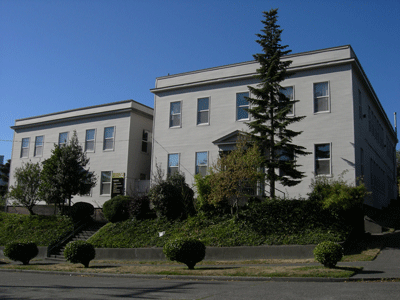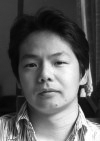
| JAPAN 533: Japanese-Language Texts at Seattle's Nihongo Gakkô |
| According to Itô Kazuo, Seattle was home to the first Japanese-language school in the contiguous United States, taught in 1902 by Shibayama Yoshio. The Nihongo Gakkô shown above was built in 1913 to house this growing school. (Hokubei hyakunen zakura 692-693.) |
Professor Hibi Yoshitaka (日比嘉高) of Nagoya University will be joining us as the 2009 Visiting Scholar of Japanese Literature. Hibi is the author of 'Jiko hyôshô' no bungakushi (A Literary History of 'Self-Representation') [expanded edition] (Tokyo: Kanrin Shobô, 2002). He also co-edited the volumes Bungaku de kangaeru 'Nihon' to wa nani ka (2007) and Tekusuto-tachi no ryotei (2008). |
 |
Professor Ted Mack and Professor Hibi Yoshitaka This goals of this seminar are as follows:
The following assignments and schedule are tentative and subject to change.
Students will be expected to supplement these core readings will relevant additional readings as necessary. |
DATE |
ASSIGNMENTS |
March 31 |
Introduction |
April 2 |
Nihongo gakko The MT 205 bus departs the HUB at 1:41, arrives at Boren and Yesler at 2:02. |
7 |
Itô Kazuo, Hokubei hyakunen zakura (Tôkyô : Hokubei hyakunenzakura Jikkô Iinkai, 1969) |
9 |
Nihongo gakko |
14 |
Wada Atsuhiko, Shomotsu no Nichibei kankei: riterashii-shi ni mukete (Tokyo: Shin'yôsha, 2007) |
16 |
Nihongo gakko |
21 |
Andrew B. Wertheimer, "Japanese American community libraries in America's concentration camps, 1942--1946," Ph.D. dissertation, The University of Wisconsin - Madison, 2004. |
24 |
Special Friday meeting: Hibi; Nihongo gakko |
28 |
Hibi: Selections by Hibi |
30 |
Hibi: Selections by Nakane, Kumei, Mack |
May 5 |
Hibi: Project presentations |
7 |
Hibi: Discussion |
7 |
Markus Lecture: Norma Field, University of Chicago, 7:30pm Preparatory reading: Shimamura Teru, "2008-nen no 'Kani kôsen' genshô," Nihon kindai bungaku 79, 131-37, this summary of Shimamura's taidan with Komori Yôichi, and this article by Matthew Ward. |
8 |
Special Workshop: Norma Field |
11 |
Special Monday meeting: Hibi |
14 |
Presentation of findings |
19 |
Presentation of findings |
21 |
Presentation of findings |
26 |
Paper drafts due |
28 |
Discussion of papers |
June 2 |
Discussion of papers |
4 |
Concluding summary |
June 11 |
Final paper due |
Most texts will be on reserve at the East Asian Library. |
|
| Some of the readings (marked with an asterisk) are available through the University of Washington E-reserves. | |
| Some of the texts for this class require Adobe Acrobat Reader. |
EXPECTATIONS and GRADING
ENROLLMENT: Enrollment in this class is with permission of the instructor only.
PARTICIPATION: Students should be prepared to explain or respond to any portion of the assigned reading. Since participation is a vital aspect of the class, attendance is required at all sessions. Unexcused absences will affect one's participation grade.
PAPERS: Students will coordinate the topic, nature, and scale of their paper with the instructor at the beginning of the term. Students are encouraged to develop a field paper during the course, applying concepts that we explore through our readings. Final papers will be submitted to academic journals in the hopes of publication.
GRADING: Your final grades will consider your participation (60%) and your paper (40%). Though the quality of your work is central to your grade, evaluations of that quality will take into consideration individual skills. Effort will be rewarded.
STUDY GROUPS: I encourage students to meet outside of class to discuss the texts and problems they have encountered in reading those texts.
CHEATING AND PLAGIARISM: The presentation of another's words and ideas as one's own is a serious offense; violations will be dealt with according to the University codes of conduct, which stipulate sanctions up to and including expulsion.
ACADEMIC ACCOMMODATIONS: I will do everything I can to accommodate students with particular needs. To request such an accommodation, please contact Disabled Student Services, 448 Schmitz, (206) 543-8924 (V/TTY). If you have a letter from Disabled Student Services indicating that you require such accommodation, we can discuss ways to meet those needs.
Page last updated on February 27, 2009